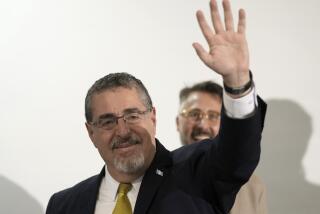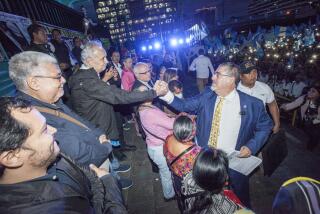Latin Version of Common Market Urged
GUATEMALA CITY — Guatemalan President Vinicio Cerezo called on Central American governments Monday to form a union similar to the European Communities to settle disputes dividing the troubled region, but El Salvador’s foreign minister refused to attend Monday’s opening session because of a dispute with Nicaragua.
Cerezo opened the third Western European-Central American meeting by saying his region could find unity through such an organization, just as European nations joined together in the Common Market after centuries of war.
However, the prospect seemed to be as distant as ever when Ricardo Acevedo Paralta, the foreign minister of the U.S.-backed Salvadoran government, who was to have delivered a brief speech at the opening session of the conference, declined to attend because Nicaragua objected.
Acevedo had been selected as spokesman for the Central Americans at a Jan. 15 meeting in San Salvador attended by the foreign ministers of Costa Rica, Honduras and Guatemala. Nicaragua was not invited to that meeting.
A European diplomat said that Miguel d’Escoto, foreign minister of Nicaragua’s leftist Sandinista government, objected because of disagreements between El Salvador and Nicaragua over peace efforts in the region.
The European countries initiated the conferences in 1984 to bolster trade between the two regions and to help Central America find a way to end its tensions without outside influence.
Belgium, Britain, Denmark, France, West Germany, Greece, Ireland, Italy, Luxembourg, the Netherlands, Portugal and Spain make up the European Communities, also known as the Common Market.
Contadora Delegation
As in each of the previous meetings, the Contadora Group--Mexico, Colombia, Venezuela and Panama--sent a delegation to push its plan for lessening the likelihood of war.
Foreign ministers from the European countries, the Central American nations--Nicaragua, Honduras, Costa Rica, Guatemala and El Salvador--and the Contadora Group are scheduled to meet for two days.
More to Read
Sign up for Essential California
The most important California stories and recommendations in your inbox every morning.
You may occasionally receive promotional content from the Los Angeles Times.








